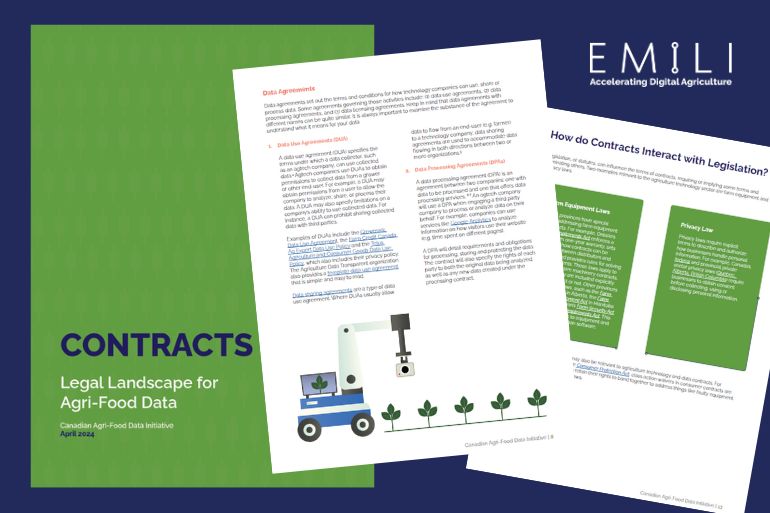
EMILI’s first Legal Landscape guidebook aims to increase understanding of agtech contracts
EMILI is creating a series of guidebooks to help non-lawyers working in the agri-food sector understand some of the key legal issues connected with the use of agricultural data.
The first in this series, focused on contracts, provides vital insight into contract law including the principles of contracting, types of agtech and agriculture data contracts, and the interaction of contracts with legislation. The guidebook finishes with a section on putting these ideas into practice by answering common questions about agtech and farm data contracts.
EMILI has worked in collaboration with a group of legal academics and practicing lawyers to draft this series. We would like to recognize David Fewer, Kaitlyn Margison, and Jordan Geist from the University of Ottawa who led the writing of the Contracts guidebook.
The importance of understanding contracts was reinforced in 2023, when a Saskatchewan judge ruled that a thumbs up emoji was sufficient to demonstrate acceptance of a grain contract offered over text message. As a result, the farmer in question was required to pay more than $82,000 for failure to deliver the promised flax seed.
“Producers and other users of digital agriculture technology are right to ask questions about the legal arrangements that impact the use of agri-food data,” said EMILI Director of Agri-Food Data Dan Lussier. “Building up the knowledge, especially among non-lawyers, helps to bring more people into the conversation and will support the continued adoption of digital tools in the agriculture and food sector.”
Download a PDF of EMILI’s contracts guidebook. Future guidebooks to be released through summer 2024 will focus on core agriculture data topics including ownership and privacy, from a Canadian perspective.
For more information visit EMILI’s Canadian Agri-Food Data Initiative (CADI). Through the Data Initiative, EMILI is working to build the data governance capacity of the Canadian agri-food sector through a unique combination of applied research projects and the development of data literacy training programs. The Data Initiative aims to empower farmers and other end-users of digital agriculture technology so they can make good decisions about their data and investments in digital tools.
